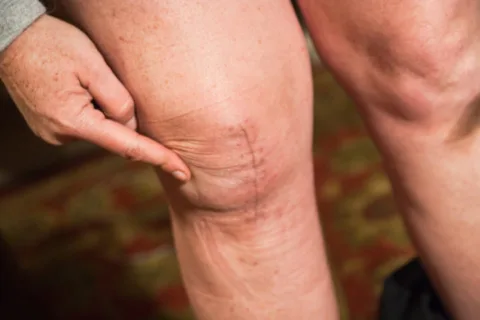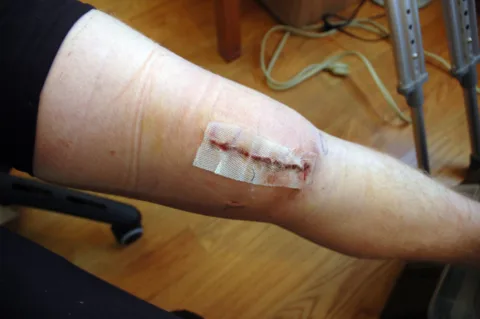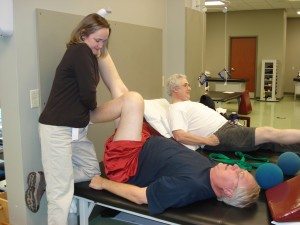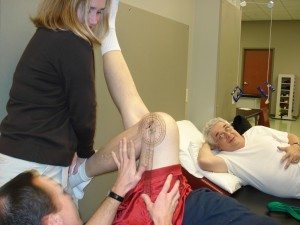I can count (on 2 hands) the number of people that I personally know who’ve had total knee replacement surgery.
One is my mom. Another is my mother-in-law. And yet another is my husband’s business partner.
In addition, several of our motorcycle friends have also had one or more of their knees replaced.
The one thing I’ve heard from all of them:
It was the best thing I ever did! I wish I hadn’t waited so long to do it.
Here’s what I’ve learned about total knee replacement surgery (… as I prepare myself for the inevitable).
Knee Replacements Are Common
Total knee replacement may sound like a radical (and scary) procedure, however as many as 60,000 people undergo knee replacement surgery every day in the United States — according to the American Academy of Orthopedic Surgeons.
Knee replacement surgery restores function and relieves pain so that you can carry on your normal activities without any discomfort.
I think the best way to calm your fears about the operation and the post-surgical recovery period is to look squarely at what happens in a total knee replacement surgery.
How To Know When Knee Surgery Is Necessary
The knee is the largest joint of the human body.
The knee is also a joint that’s in constant use and is most subject to the forces of gravity.
These 2 factors make the knee joint vulnerable to wear & tear over time.
Osteoarthritis, a degenerative joint disease that causes the cartilage of the body to wear out, occurs with aging and sometimes with joint injury. The disease can progress to a severe state in which bones of the joint rub together causing continuous pain any time you use your knee.
Rest assured that no physician reaches first for a total knee replacement surgery.
This procedure is generally reserved for after you’ve already exhausted other methods to repair the knee joint and restore mobility — such as pain medications, steroids for inflammation, lubricating injections, physical therapy, or other minor knee surgeries.
What Happens Before Surgery
Your orthopedic surgeon will order tests to determine how much damage is in the knee joint and whether procedures other than total knee replacement (also called knee arthroplasty) will benefit you:
- First, x-rays will reveal how much the bones have been damaged.
- Next, the results from an MRI (magnetic resonance imaging) will show any soft tissue damage around the joint.
These 2 tests will tell the surgeon a great deal about your knee and what must be done to restore mobility.
Your orthopedic surgeon will probably encourage you to attend a total knee replacement seminar that explains the procedure and describes the post-surgical needs and therapy that will be an important part of your recovery process.
These classes will help to allay any fears you might have about the operation. You’ll also be better prepared for what you can expect during the recovery period.
What Knee Replacement Surgery Is Like
Often, the explanation of the procedure itself is the most disturbing part of preparing for total knee replacement.
But it’s also the most amazing, scientifically speaking.
Here’s what happens during the operation:
- The damaged ends of the bones of the knee joints are removed with special tools — to create a suitable surface for the new joint parts.
- These metal parts are then installed on the bone ends with glue or other methods that hold them securely in place.
- Special plastic spacers then fit in around the metal bone ends.
- The kneecap is then restored to provide a fully functioning and natural-looking knee joint.
- The skin is then closed and bandaged. This procedure is done while you are under general anesthesia and under careful monitoring.
- You are then taken to the recovery area until they become conscious. Pain medication is immediately administered to keep you comfortable as you regain consciousness.
Immediately After Knee Replacement Surgery
During the post-surgery period, the nursing staff will attempt to rouse you from unconsciousness and take your vital signs to ensure that you are progressing normally.
You may have a morphine pump installed so that you can regulate the amount of painkiller you need by simply pushing a button. Have no fear that you will overdose yourself if you push the button too much — the limits are already set within the pump.
It will take some time for you to feel like yourself after surgery. You may be offered something to eat, but don’t be surprised if you feel a bit nauseous from the anesthesia. This is normal. It’s a feeling that will wear off in a short time.
Your vital signs will be checked regularly and your wound examined to see that it is healing as it should be.
What The Days After Surgery Will Be Like
You will probably be encouraged to stand up and walk around — with help — the day after surgery.
Though this might seem a bit premature, it can speed up your healing. It also helps prevent blood clots.
You may be x-rayed to see that your new knee joint is properly positioned within the wound.
As the days go on, you will walk through the hallways more and more.
Finally, they will arrange the post-surgical physical therapy that is so important to your new knee joint’s success.
Be sure to follow your surgeon’s instructions carefully. I’ve seen firsthand that if you do, you will heal much more quickly. And if you don’t, it will be much longer before you can resume your normal life.
Post-Surgery Physical Therapy
You may be required to have 4 weeks (or more) of physical therapy to ensure that full motion of the new joint is restored. It starts in a rehab facility, then continues on your own at home.
Proper physical therapy can make or break the success of your new knee, so follow the therapist’s instructions to the letter.
Here’s a knee surgery recovery timeline – from Day 1 to Week 12 – what you can expect.
You will be given pain medication to take while you are getting physical therapy — because the exercises can sometimes cause pain during and after the sessions. Make sure you take your medication, as needed. Not taking it will not make you a hero. It will only set back your physical therapy and delay your ultimate recovery.
Complications of Knee Replacement Surgery
If you’re considering total knee replacement surgery, then you’ll be happy to know that most knee surgeries go smoothly with no complications.
This type of surgery has been done so often on so many people that the procedures have been perfected.
However, occasionally problems do arise. The Arthritis Foundation-funded research determined that 2% of low-risk surgeries experienced complications, while 7.4% of high-risk surgeries (that included patients with other diseases) experienced complications.
Complications may include problems with anesthesia, infection of the wound site, blood clots, stroke, and problems with the joint itself. Treatment of the complications will likely extend your hospital stay or even lead to more surgery.
Though total knee replacement may seem like a drastic move at first, and you may even be a little frightened to go through with it, hopefully you’ll take comfort in knowing that the majority of people who’ve undergone the surgery now live active, fulfilling lives with no knee problems at all to hold them back from their favorite activities.
Knee Replacement Surgery Resources
- Step-By-Step: What Knee Replacement Surgery Is Like
- Total Knee Replacement Surgery FAQs
- Consumer Reports: What Really Works For Hip & Knee Pain
- Minimally Invasive Total Knee Replacement
- Total Knee Replacement: A Patient’s Guide
- How Much Does Total Knee Replacement Surgery Cost?
- John Hopkins: The Knee Replacement Surgery Procedure








